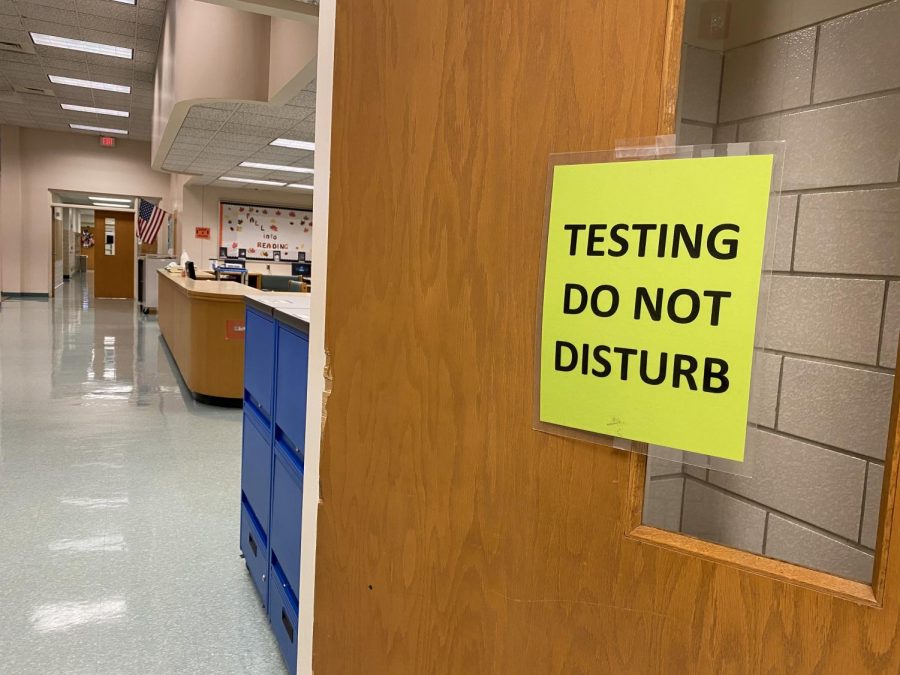The pressures of state-mandated testing
November 2, 2020
State-mandated testing can be very stressful for many students and teachers. There are often barriers and conflicts that come along with having to do the mandatory testing by a certain time and within a narrow environment. Just having an off day can throw off a student’s scores. Students from each grade, teachers, counselors, and principals are each feeling the pressure of state-mandated testing in unique ways depending on their perspectives.
From the middle school perspective, students seemed a little less worried, but the things they were worried about was how state-mandated testing affects their timeline for getting into high school. Many of them also talked about how the tests make them very nervous because of scores and getting answers wrong.
Beau Pierce, eighth grade, said, “[I] don’t like them; I’m always rushing because I’m scared I’m going to fail. And I don’t want to get held back because then I will fail– and then I won’t graduate.”
High school students, especially juniors and seniors, tended to be more worried about how their grades might look to colleges and having to remember all of the information for the test, some of which they felt was never taught.
Junior Taylor Fenstermaker said, “Going into it not knowing what’s going to be on it, how do you study for it then?”
When Alexa Turben, 12th grade, was asked what the pressures of state mandated testing were, she said, “They tell you to study for the state-mandated tests, but expect you not to fall behind in your other classes from missing class time.”
They dislike that there is a ton of scripted monologue for the teachers and that they don’t tell you what you should study. Most of them also said that missing class time to take them also puts them behind in class over something out of your control.
“[The] grades and also having to know stuff because it’s been so long since I’ve done it,” Freshman Tavon Kornikoski said, and then added, “It’s about passing, it really is.”
“The way the teachers have to say scripted stuff; I hate it,” said Ryah Lambert, tenth grader.
Many of the middle school teachers said that it was hard to cram the information in the curriculum that is needed for testing. They also spoke of the pressures that come with not being in school for 5-6 months. These two factors were brought up many times as concerns for students, most of all the students that struggle. Some also felt that the cramming and mass testing is not appropriate for students to have to do.
Mrs. Beebe, who teaches seventh grade ELA, said, “We’re asking kids to do things that are not always developmentally appropriate. It’s appropriate to be having the standards but the fact that they test you so much is ridiculous. “
The view that it is not fair to students in the way we measure their knowledge and understanding of the concepts was also shared by some of the high school teachers.
High school science teacher Mr. Potocki said, “Kids are different, so for one test to evaluate what each kid knows is next to impossible. We try to encourage kids to be unique, but we try to evaluate them on what they learn, but we do not evaluate them in ways that will respect the uniqueness.”
There was also the widely expressed idea by the teachers that it is hard to have to teach to a test because you don’t get to teach many of the things you would like to teach that students would enjoy. There isn’t as wide of a selection of material to use when forced to teach for a test.
“The material that you had to focus on and cram– there wasn’t as many freedoms to venture off and teach things and math that would be more fun to learn; you’re very confined by the math curriculum,” said Mr. Luther, Algebra 2.
There is also not always enough time to teach what needs to/ should be taught. There isn’t always enough material at teacher’s disposal to use to teach it as well.
Ms. DiLuzio, who teaches language for layman, said, “Having a limited scope with which to use as academic criteria.”
“Getting through the curriculum, so you have to move at a faster pace, so you can’t do as many lab activities,” Biology and high school science teacher Mrs. Jackman said.
There was also a lot of concern with regards to how the pandemic effected students testing this year.
High school English teacher Mrs. Reynolds felt that, “They missed out on their education for approximately five months and they didn’t get as many opportunities to learn. There’s a lot of catching up and so much ends up depending on state testing. We didn’t even have time to do prep work with the students and had not even a month because they started testing around spirit week, so there wasn’t even a month and they’re already being tested.”
From the administrative viewpoint, there is a ton of pressure for the school to get funding from our testing. It is hard when we are at a demographic disadvantage to help kids be prepared to test and graduate, but if they perform poorly it ends up reflecting negatively on the school even if there are outside factors at play.
Director of Secondary Education, Mr. West, when asked about the pressures of state-mandated testing, said, “The pressure of state mandated testing is accountability from both the state and federal governments for schools to perform at a certain level.”
Assistant Principal Mr. Passinger added, “When it comes to the administrative and district level, the schools get graded on it, so there’s pressures there as well.” Passinger continued, “It’s a requirement to have to test the kids no matter what, but there is a new change to take some challenges off of kids…the new six pathways, the Act 158, with alternate assessments. [This] will give kids some other ways to graduate and it’s better than just putting it all on one test.”
Though state-mandated testing may not always seem fair to students, they don’t have much choice in the matter of where to draw the line. There aren’t many ways to broadly test for each mind, but schools are trying to work towards other ways of going about it, so for now students and teachers are going to have to keep testing.



